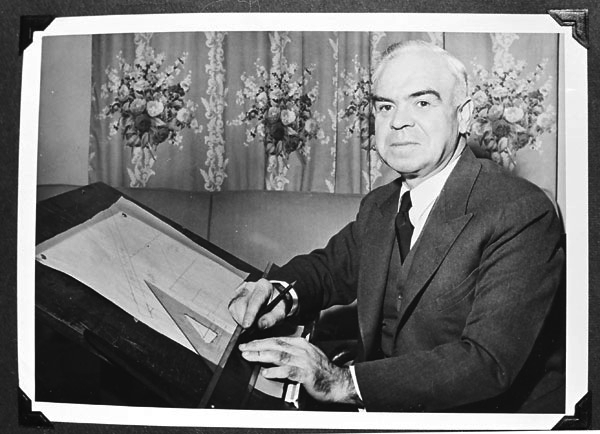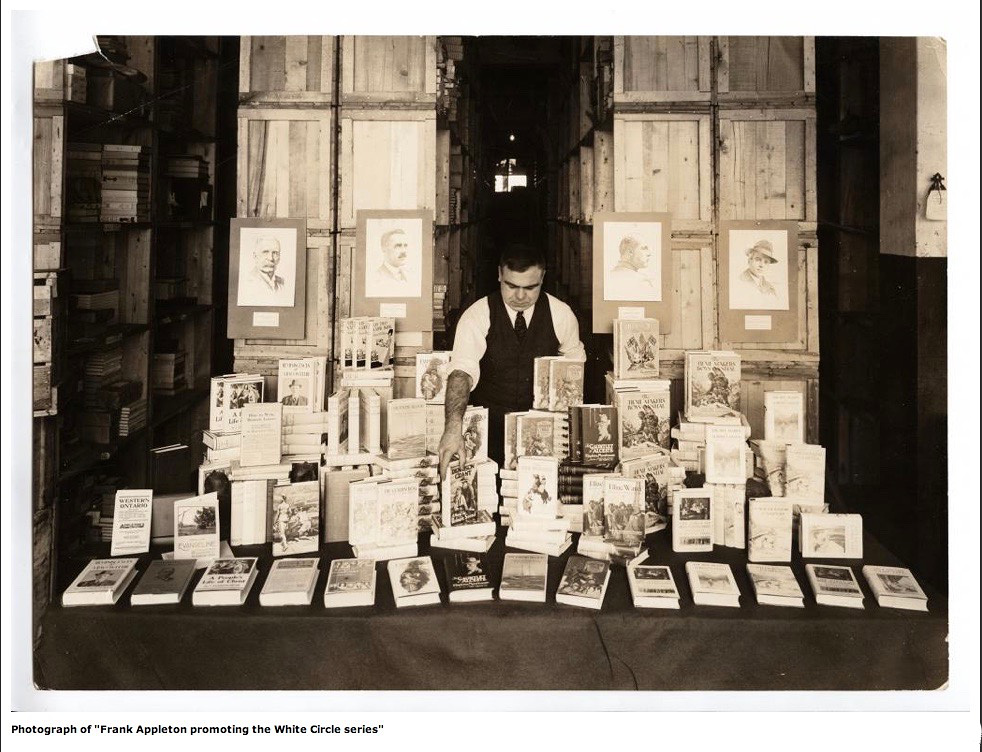Franklin Fletcher Appleton
My Grandfather


In the footsteps of my Grandfather
I never had the privilege of meeting my maternal Grandfather, Franklin Fletcher Appleton, but I’ve always felt his presence in my life. He was an imposing looking man with a chiselled and serious face, but I am told he was gentle and everyone loved him. My Grandfather was a book publisher. In fact, he was the head of Wm. Collins and Sons in the 1940s during some of the most difficult and tender days of Canadian book publishing. He was there at the beginning of many great Canadian literary careers.
Here is the picture of my Grandfather sitting at his/my drafting table. He is actually working on a building design, which I suspect was the family home he designed and had built in Toronto. After flowing through many other members of my family, I ended up with that drafting table. I used it all through design school and later when I started a freelance design business. Right now it is in the care of my sister-in-law, holding on to it for me until I am able to fit it into my space again. I love that table. I love the story that comes with it. I love the energy it stores. I always felt proud that I sat at the same table and designed things, the way my Grandfather did.
A few years ago, a psychic told me that my Grandfather Appleton was keeping a watch over me. That I was “on his chain”. That information didn’t surprise me, but it completely delighted me.
The connection to my Grandfather just got deeper
Recently I dove into my family photos box and jumped on the internet in search of more bits and pieces about my Grandfather and I was rewarded handsomely.
Through an internet search I came across a paper written by Grant Campbell BA, MISt, Toronto; MA, PhD Queens, year unknown, called, William Collins During World War II: Nationalism Meets a Wartime Economy in Canadian Publishing. In Campbell’s writing, my Grandfather Appleton figures prominently of course, because he was the head of Wm. Collins & Sons before and during the war. It was thrilling to read about what my Grandfather had to face during the war restrictions, and especially how he was determined to promote and encourage a national identity through Canadian publishing.
For those of you interested in books in Canada, this is an interesting piece of history. I have taken excerpts from the longer article.
William Collins During World War II: Nationalism Meets a Wartime Economy in Canadian Publishing
“Trade publishing in English Canada, then, was being shaped by the contingencies of a wartime economy, contingencies that acted severely on the physical product. Paper shortages demanded narrower margins and lighter papers, labour shortages and educational publishing demands forced printers to produce far below their potential output of trade books, making it difficult to keep popular titles in stock, and encouraging booksellers to fill the gap by importing from the United States. Book to Context: Book Production as a Political Act In the face of these severe constrictions, the behaviour of Frank Appleton at Collins at first seems strange. In particular, his enthusiasm for the book as a material object, his insistence on high standards of layout and typography, and his approval of wide margins, large type, attractive dust jackets, and high-quality illustrations could almost been seen as unpatriotic in a business environment that advocated the utmost stringencies as the best way to serve the war cause.
Franklin Appleton was a committed nationalist. This nationalism found its way into the physical books themselves; the dust jackets for Robin’s Incomplete Anglers boasts a circular emblem that proclaims it to be “A Canadian Book.” “He was one of the first in Canada to endow good writing with beautiful format, thereby raising the whole tone of book publishing here. The books he published were symbols of his own aesthetic and moral integrity,” wrote Lorne Pierce at Ryerson Press.
Campbell went on to say: “On the one hand, the contingencies of publishing demanded severe compromises in order to preserve paper and to utilize slender labour resources in the most efficient possible way. At the same time, contingencies of Canada’s growing nationalism demanded the production of books that were aesthetically-satisfying physical objects, with an artistic integrity all their own. The books produced by Collins during the Second World War enact this dual agenda in their very physical qualities. They are testaments to a mood in which a rising nationalism and national pride demanded some reflection in the production of well-designed, aesthetically-satisfying Canadian books, in a business environment that barely enabled books to be produced at all.
They are beautiful, fragile artefacts of an eventful stage in Canadian publishing history.”
Thank you Grant Campbell for your wonderful research, it was a delight to read and it deepened my connection to a man who is very much a part of my life. What I find fascinating about this whole story is that it involves something that so many of us just take for granted. Books. We’ve always had them. I grew up with a certain reverance for books, but I never appreciated the struggle that people like my Grandfather had to go through to make sure we had a Canadian identity in publishing. I will never look at a Canadian book the same way again.
If you are interested in the whole article by Grant Campbell, here’s the link to the PDF. It’s really quite interesting!
